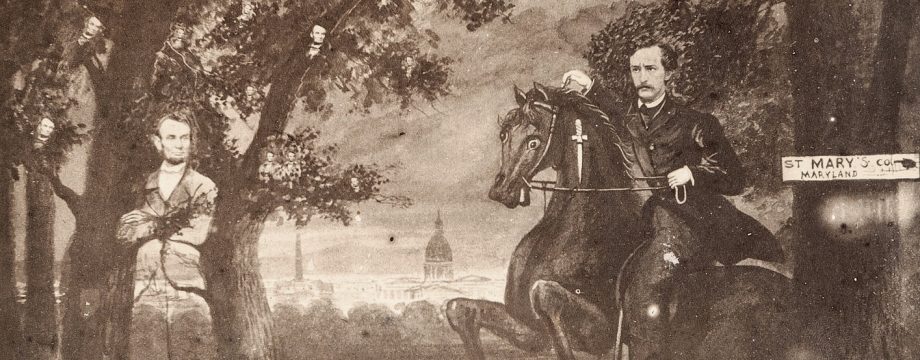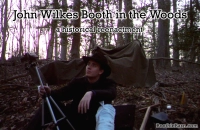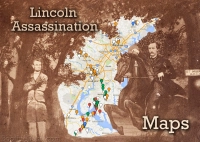Monday, June 19, 1865
Previous Session Trial Home Next Session
Proceedings
The court convened at 10 o’clock.[1]
Present: All nine members of the military commission, the eight conspirators, Judge Advocate General Joseph Holt, Assistant Judge Advocates Bingham and Burnett, the recorders of the court, lawyers Frederick Aiken, John Clampitt, and Walter Cox.
Absent: Reverdy Johnson, William Doster, Thomas Ewing, and Frederick Stone.
Seating chart:
The prisoners were seated in the same manner as the day before.
The reading of the prior session’s testimony was completed at half past 10 o’clock.[2]
Frederick Aiken, lawyer for Mrs. Surratt, informed the court that, given the voluminous amount of evidence involved in his client’s case, he required some more time before presenting his closing argument. Rather than presenting tomorrow as he originally intended, Aiken begged the court’s permission to schedule his closing argument for Mary Surratt for Wednesday, June 21, at 2 o’clock. John Clampitt, Aiken’s co-counsel, informed the court that he was prepared to read Reverdy Johnson’s closing argument against the jurisdiction of the court today. Judge Advocate General Joseph Holt told Clampitt to proceed with the argument.[3]
Arguments began
Reverdy Johnson’s argument, which can be read in full by clicking here or on the image above, did not deal with any of the evidence concerning Mrs. Surratt. Instead, it was an expertly researched legal document regarding the proper and improper use of military commissions. Johnson, and many other legal scholars since 1865, have debated the constitutionality of using a military commission to try the conspirators when the civilian courts were open. Fellow attorneys William Doster, Frederick Stone, and Thomas Ewing would also include arguments regarding the jurisdiction in their own closing arguments for their clients in hopes of getting the conspirators a new trial with a jury of their peers. However, in his later memoirs, William Doster recalled the slightly futile nature of arguing against the commission’s jurisdiction to a group of military officers who were not legal scholars:
“Reverdy Johnson, one of the counsel for Mrs. Surratt,…said at the outset: ‘The only hope of these people lies in a successful plea to the jurisdiction and a civil trial,’ and he as well as most of the other counsel laid their greatest strength on that. Of course, the success of one would be the success of all. I had had experience with that plea before, and never for a moment imagined these officers would dispute the sense of Stanton’s orders, or doubt the law of Attorney-General Speed, who assured them they were all right. I did hope, however, that the people and the press would support it. Accordingly, I also plead to the jurisdiction as a matter of form. Mr. Johnson wrote out his long argument, and Mr. Aikin, one of his colleagues, read it to the court, although it was meant for the President and the people. It was very able and exhausted the subject. From what members of the court have since told me, it had no effect on them whatever. They had Stanton’s orders, and that was enough for them who were in the service of the United States.”[4]
After John Clampitt finished reading Reverdy Johnson’s argument, Judge Advocate General Holt announced that he had received a note from Frederick Stone, David Herold’s lawyer.
Stone wrote that he was necessarily absent from Washington and asked that his closing argument on behalf of his client be read to the court by Richard Suttton or another of the court reporters on duty at the trial. There was no objection to the request and court reporter James Murphy was tasked with the reading.[5]
Frederick Stone’s argument for David Herold, which can be read in full by clicking here or on the image above, spent a considerable amount of time questioning the jurisdiction of the court with only a small portion devoted to the evidence against his client. Given that David Herold went on the run with Booth after the assassination, Stone may have felt pleading against the commission’s jurisdiction was his best option. Still, Stone did address the case against his client and this part of the closing argument was summed up nicely by the Evening Star newspaper:
“The counsel denies there is any evidence that Herold procured, consulted, commanded or abetted Booth to assassinate the President. But of what guilt in this case is the flight of Herold evidence? He is found with Booth, and his flight in this case is not only evidence but constitutes the guilt he has acknowledged. It constitutes the guilt of his aiding in the escape of Booth, but no more. It by no means follows because he aided Booth to escape that he aided him to kill the President.
Herold was a weak, cowardly, foolish, miserable boy. Booth exercised control over him, body and soul. He knew some of the roads through lower Maryland, and Booth persuaded him to act as guide, foot-boy, companion. This accounts for their companionship. The feeble aid that Herold could render to any enterprise was rendered in accompanying and aiding Booth in his flight, and nothing beyond. That of itself is a grave crime, and carries with it its appropriate punishment.”[6]
Break
At around 12:30 pm, in the midst of the reading of Frederick Stone’s closing argument for David Herold, Mary Surratt became ill, likely on account of the heat and the nature of her deteriorating health in prison.
She was removed not to her cell, but into one of the adjoining rooms of the court room. General David Hunter, president of the commission, announced that on account of Mrs. Surratt’s illness, the court would take their hour break for lunch early. The remaining conspirators were returned to their cells. At 2 o’clock, the court reassembled with Mrs. Surratt being placed in a chair in the doorway leading to the side room. In this way she was able to enjoy a cooler position than on the prisoner’s dock.[7]
Arguments continued

James Murphy, the court reporter, finished up reading the remaining part of Frederick Stone’s closing argument for David Herold.

Walter Cox, the attorney for Michael O’Laughlen, then started his closing argument. His argument dealt not only with his own client but also Samuel Arnold. It appears that some conversation had occurred between Cox and Thomas Ewing, Samuel Arnold’s attorney, in which Cox decided to incorporate some Arnold’s case into his closing arguments. The arrangement made sense as the cases of O’Laughlen and Arnold were very similar with both men having been a part of John Wilkes Booth’s initial kidnapping plot and having left the plot prior to the assassination. This accommodation and division of labor between the separate defense attorneys shows the cooperation that had developed between them all.
Walter Cox’s closing argument on behalf of Michael O’Laughlen and Samuel Arnold can be read in full by clicking here or on the image above. Cox spent a considerable amount of space lambasting the disadvantages faced by the accused and their defense through the improper operation of the trial. Cox also spoke out against the volume of unrelated testimony dealing with such matters as Confederate Prisoner of War Camps, the attempt to burn New York City, Yellow Fever infected clothing, the bombing City Point, and the admission of clearly fabricated conspiracy letters by the prosecution. For a nice summary of Cox’s points regarding the specific cases of O’Laughlen and Arnold, the Evening Star newspaper provided the following:
“The evidence, [Cox] contended, showed that even if these two accused were even beguiled for a moment to listen to the suggestions of this restless schemer, Booth, there was no blood on their hands, and they are wholly guiltless of all previous knowledge of, and participation in that ‘arch deed of malice’ which plunged the nation into mourning…
Now it is clear that if any connection is shown between Booth on one hand and O’Laughlin and Arnold on the other, it only existed during the period when this absurd project of capture was agitated, and terminated with that…This was the beginning and the end of their connection with Booth in any scheme whatever of a political character. And in this, it is evident that he was the arch contriver and they the dupes. And when they had once escaped his influence, although he still evidently clung to his design, and telegraphed, and wrote and called to see them, it is evident that they refused to heed the voice of the charmer…
The accused, Samuel Arnold and Michael O’Laughlin, had no part whatever in the execution of the conspiracy set forth in this charge and specifications. That if they were implicated in such conspiracy they withdrew from and abandoned it while yet wholly unexecuted and resting merely in intention, and are not responsible for any of the acts subsequently done in pursuance of it…
That the accused were wrong in ever joining the rebellion against their Government no one will deny; that they were wrong in ever listening for a moment, if they ever did, to any propositions from that wicked schemer Booth, inimical to their Government no one will deny… This Court [is] not sitting in judgement on all the errors in the lives of these accused; but to decide the single question whether they are guilty of conspiring to kill and murder the President, Vice President, Secretary of state and the General in command of the armies of the United States, and of the acts charged against them severally in pursuance of said conspiracy…Upon [this] they must be wholly acquitted.”[8]
After Walter Cox completed the closing arguments for Michael O’Laughlen and Samuel Arnold, Judge Advocate General Holt asked if any of the other defense lawyers would be ready to proceed tomorrow. Frederick Aiken reiterated that he would need until Wednesday to finish his argument for Mary Surratt. Both Thomas Ewing and William Doster were absent from the court, likely working on their own closing arguments. Aiken stated that, from a conversation he had with Thomas Ewing the day before, the closing argument on behalf of Edman Spangler had been completed. But Aiken was unsure if Ewing had intended to present that argument tomorrow. Thomas Ewing had told Aiken that he would not be ready to present on Dr. Mudd’s case until Friday.
Not happy with the delay, the commission directed Holt to notify Thomas Ewing that the expectation was for all of the defense’s closing arguments to be completed by Wednesday.[9]
After completing the discussion of when the remaining defense lawyers would be ready to present, the court adjourned at around 5 o’clock.[10]
Recollections
“The Commission met this morning and all were present. We got through the argument of three of the Council which was all that were now prepared.”[11]
Newspaper Descriptions
“The complete record of the Court proceedings, as taken by Mr. Sutton’s corps, looms up on the table of the reporters in two huge piles of manuscript, to the extent of 4,500 pages.”[12]
Mrs. Surratt
“During the reading of Mr. Stone’s argument, General Hunter announced that one of the prisoners, Mrs. Surratt, was quite indisposed, and that in consequence the Court would take a recess until 2 p.m.”[13]
“Early in the day Mrs. Surratt was compelled to be taken from the court-room, owing to severe sickness.”[14]
Samuel Arnold
“Arnold himself evidently thinks his punishment will not be a heavy one, and endures the trials of cell and court room with serene and hopeful face.”[15]
Visitors
“The court room of the military commission engaged in trying the assassination conspirators was crowded again today.”[16]
“The Court room is not so much crowded to-day as usual, probably on account of the excessively hot weather. Among others present there are four sisters of the prisoner Herold, attired in deep mourning and sitting near the prisoner.”[17]
Julia Wilbur was an anti-slavery relief society worker who resided in Washington, D.C. A lifelong diarist, Ms. Wilbur kept track of her daily movements and the important events she witnessed. On this date, Ms. Wilbur attended the trial of the conspirators, wrote about it in her diary, and included a couple of sketches of the courtroom:
“At 8 went for Mrs. Colman & got note of introduction to Judge Holt from Judge Day & proceeded to the Penitentiary.
Thought I might as well see some thing of this important trial.
Mr. Clampitt read argument against Jurisdiction of Court by Reverdy Johnson.
It was very hot there. Mrs. Suratt was sick & was allowed to leave the room & then they adjourned till 2, & we left. Mrs. S. wore a veil over her face & also held a fan before it all the while.
Harold’s sisters (4) were in the room. The prisoners excepting Mrs. S. & O’Laughlin appeared quite unconcerned. They are all evidently of a low type of humanity. Great contrast to the fine, noble looking men that compose the court.
This was the position of the court.
It was an interesting scene, & I am glad I went, although it is so far, & so hot.”[18]
Previous Session Trial Home Next Session
[1] John F. Hartranft, The Lincoln Assassination Conspirators: Their Confinement and Execution, as Recorded in the Letterbook of John Frederick Hartranft, ed. Edward Steers, Jr. and Harold Holzer (Baton Rouge, LA: Louisiana State University Press, 2009), 127.
[2] Evening Star (Washington, D.C.), June 19, 1865, 2.
[3] William C. Edwards, ed., The Lincoln Assassination – The Court Transcripts (Self-published: Google Books, 2012), 1199.
[4] William E. Doster, Lincoln and Episodes of the Civil War (New York: G. P. Putnam’s Sons, 1915), 262 – 263.
[5] Edwards, Court Transcripts, 1199.
[6] Evening Star (Washington, D.C.), June 19, 1865, 2.
[7] Hartranft, Letterbook, 127.
[8] Evening Star (Washington, D.C.), June 19, 1865, 2.
[9] Edwards, Court Transcripts, 1200.
[10] Hartranft, Letterbook, 127.
[11] August V. Kautz, June 19, 1865 diary entry (Unpublished diary: Library of Congress, August V. Kautz Papers).
[12] Evening Star (Washington, D.C.), June 19, 1865, 2.
[13] Evening Star (Washington, D.C.), June 19, 1865, 2.
[14] New-York Tribune (New York, NY), June 20, 1865, 1.
[15] Boston Daily Advertiser (Boston, MA), June 20, 1865, 2.
[16] Boston Daily Advertiser (Boston, MA), June 20, 1865, 1.
[17] Evening Star (Washington, D.C.), June 19, 1865, 2.
[18] Julia Ann Wilbur, June 19, 1865 diary entry (Unpublished diary: Haverford College, Julia Wilbur Papers).
The drawing of the conspirators as they were seated on the prisoners’ dock on this day was created by artist and historian Jackie Roche.






















Pingback: The Testimony Regarding David Herold | LincolnConspirators.com
Pingback: The Testimony Regarding Michael O’Laughlen | LincolnConspirators.com